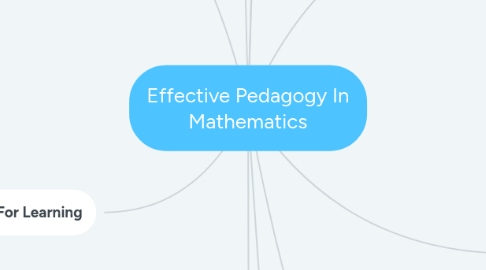Effective Pedagogy In Mathematics
by Paul Barsketis


1. An Ethic Of Care
1.1. Creating Caring and Trusting Classroom Relationships that allow students to believe in themselves as Learners
1.2. Procedures and Routines
1.3. Creating Classroom Neighbourhoods
1.4. Promoting Classroom Relationships that allow students to think for themselves, ask questions, and take intellectual risks
1.5. Inclusive Classrooms that take into account Differing Needs
2. Arranging For Learning
2.1. Independent Learning Listening
2.1.1. Listening, Writing, Answering, Question and Critically Assessing
2.2. Classrooms that promote thinking, reasoning, communication, reflection and critique
2.3. Collaborative Learning
2.4. Whole Class Discussion
2.5. Partners and Small Groups
2.6. Facilitating Discourse
3. Tools and Representations
4. Building On Students' Thinking
4.1. Instead of trying to fix weaknesses and fill gaps, teachers build on existing proficiencies, adjusting instruction to meet students' learning needs.
4.2. Starting Points
4.3. Challenge and Extend Thinking
4.4. High but realistic expectations
4.5. Conceptual Development
5. Worthwhile Mathematical Tasks
5.1. Engaging with tasks that students' develop ideas about the nature of mathematics
5.2. Doers and Learners
5.3. Connect to Concepts, Understandings and Meaning
5.4. Design Learning Experiences
5.5. Tasks that require students to think deeply about mathematical ideas and connections.
5.6. Mathematical play and doing mathematics
6. Making Connections
6.1. Tasks that require students to make multiple connections within and across topics.
6.2. Appreciate the interconnectedness of math in everyday life.
6.3. Finding patterns
6.4. Conceptual understanding
6.5. Computational flexibility, Algorithms and Alternative Algorithms
6.6. Multiple Perspectives and Contexts
6.7. Sharing solutions and strategies with other students - Collaboration
7. Assessment For Learning
7.1. Formal and Informal Assessments
7.2. Teaching and Learning Decisions - What works and doesn't work.
7.3. Observations and Anecdotal notes
7.4. Expectations and Assumptions
7.5. Teacher Questioning and Bloom's Taxonomy
7.6. Cognitive Development
7.7. Productively Engaged in Learning
7.8. Feedback and Critique
7.9. Student and Teacher Conferencing
7.10. Student and Teacher PLC groups
7.11. Developing greater self-awareness
8. Mathematical Communication
8.1. Mathematical argumentation and discourse
8.2. Shifting from procedural rules to making sense of mathematics
8.3. Revoicing - repeating, rephrasing, expanding. Finding multiple points of perspective in which a student can tap into learning and understanding
8.4. Conjecture
8.5. Curiosity and the joy of finding out - learning
9. Mathematical Language
9.1. Fostering the use and understanding of terminology within mathematical communities
9.2. Explicit Language Instruction with telling and modelling
9.3. Vocabulary
9.4. Underlying meanings
9.5. Using technology to engage with mathematical language orally and visually
9.6. Links to real world applications
10. Teacher Knowledge
10.1. How teacher's organize classroom instruction
10.2. Managing Multiple Student viewpoints
10.3. A grounded understanding of students as learners
10.3.1. Developing self-awareness based on student conceptions and misconceptions

